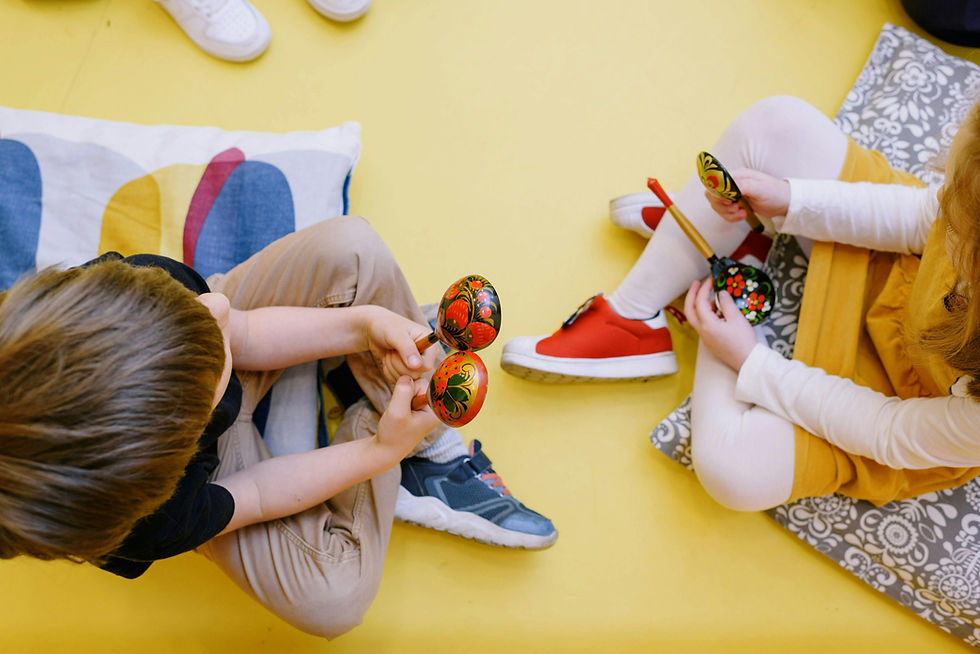How Music Boosts Brainpower in Kids and Teens
- Brittany Bennett
- Sep 22
- 4 min read

Have you ever noticed how kids light up when they hear music? Whether it’s dancing to a favorite song, humming a melody, or banging on a toy drum, music seems to unlock something powerful. And science backs it up—music isn’t just fun. It actively shapes young brains.
In today’s fast-paced, tech-driven world, parents and educators are always looking for meaningful ways to support cognitive development in children and teens. Turns out, music might just be one of the most powerful tools we have. From boosting memory and focus to improving emotional regulation and creativity, the benefits of music education are wide-reaching and long-lasting.
Let’s explore why music education is one of the smartest decisions you can make for your child’s brain.
1. Music Strengthens Memory
One of the most well-documented benefits of music education is its positive effect on memory. When children learn an instrument or practice singing, they’re not just learning notes—they’re training their brain to store, recall, and organize complex patterns.
Studies show that students involved in music education score higher on verbal memory tests. Why? Because reading music, recalling sequences, and performing pieces requires active engagement from multiple areas of the brain, especially those linked to auditory and working memory.
Bonus: Music training has even been linked to improved memory performance in non-musical subjects like language arts and science.
2. Music Enhances Focus and Attention
Kids today are bombarded with distractions. Social media, online games, and constant notifications can make it harder than ever to concentrate. Music, however, offers a focused and disciplined alternative.
Learning to play an instrument or perform in an ensemble requires intense concentration. Students have to focus on timing, pitch, rhythm, dynamics—and do it all in real time. Over time, this kind of practice sharpens their ability to pay attention and stay on task.
In fact, researchers have found that kids with musical training often show better performance on tasks that involve sustained attention and impulse control—two key skills for academic success.
3. Music Builds Math and Language Skills
Ever heard the phrase “music is math”? It’s true. Reading music involves understanding patterns, ratios, and fractions. Rhythm, tempo, and meter all reinforce fundamental math concepts in a fun and experiential way.
And then there’s language. Because music and language processing both occur in overlapping brain regions, kids who study music tend to develop stronger reading and verbal skills. They’re better at phonemic awareness, vocabulary acquisition, and sentence comprehension.
In one landmark study, children who participated in regular music training showed faster development in the brain areas responsible for reading and speech.
4. Music Encourages Emotional Intelligence
Music isn’t just cognitive—it’s emotional. Whether it's the joy of mastering a new piece, the pride of performing on stage, or simply expressing feelings through sound, music helps young learners build emotional awareness and regulation.
Through music, kids learn to:
Process complex emotions
Handle performance anxiety
Develop empathy when playing with others
Celebrate progress, not just perfection
Group music-making, like choir or orchestra, also fosters teamwork and respect—vital life skills that go beyond the classroom.
5. Music Sparks Creativity
In a world that increasingly values innovation and problem-solving, creativity is more than a “nice-to-have”—it’s a necessity.
Music gives kids a powerful outlet to explore, create, and express themselves in unique ways. Whether it’s improvising a melody, composing a new piece, or interpreting a song in their own voice, music invites imagination and experimentation.
This creative freedom doesn’t just stay within the practice room—it translates into flexible thinking, better problem-solving, and a greater willingness to take healthy risks in other areas of life.
6. Music Boosts Confidence
Let’s not underestimate the confidence that comes from music. When a child masters a new chord, sings in harmony, or takes the stage for the first time, they feel accomplished.
Through regular practice, feedback, and performance, music teaches children that progress comes through effort. They learn resilience, discipline, and self-motivation—traits that build a growth mindset and fuel long-term achievement.
And here’s the best part: that sense of confidence often carries into other subjects, extracurriculars, and social interactions. A child who believes “I can do this” in music is more likely to believe the same in math, science, or sports.
7. Music Offers a Mental Health Boost
In a time when many kids and teens are navigating anxiety, academic stress, and social pressure, music offers a powerful emotional outlet.
Listening to or making music can:
Reduce cortisol (stress hormone) levels
Boost dopamine (feel-good chemical) production
Provide a sense of routine and control
Offer a healthy way to express emotions
In fact, many therapists use music-based activities to support children with ADHD, autism, and emotional disorders because of its calming and focusing effects.
8. Music Learning is Lifelong
One of the most beautiful things about music is that it grows with you. What starts as a fun hobby in childhood can evolve into a lifelong passion, a community connection, or even a career.
And even if your child doesn’t pursue music professionally, the brain benefits they gain now will support them throughout their life—in school, relationships, and beyond.
Final Note: Music is Brain Food
If you’re looking for an enriching activity that builds brains, strengthens hearts, and brings joy into your child’s life—music education checks every box.
At NoteWise Music Academy, we see these transformations every day. Our students grow not just as musicians, but as confident, curious, and capable young individuals ready to take on the world.
Ready to give your child the brain boost of music? Let’s make some noise—together.





Comments